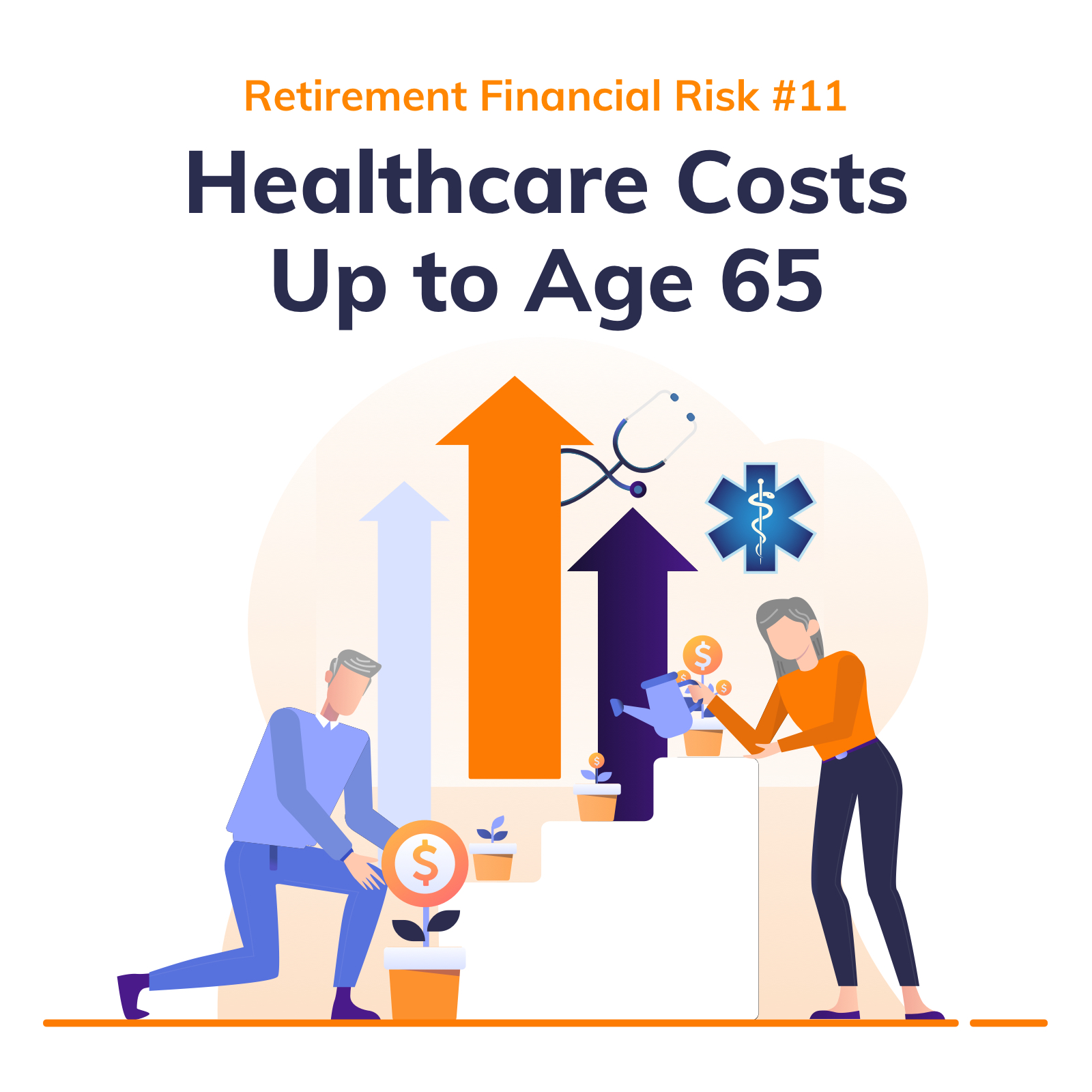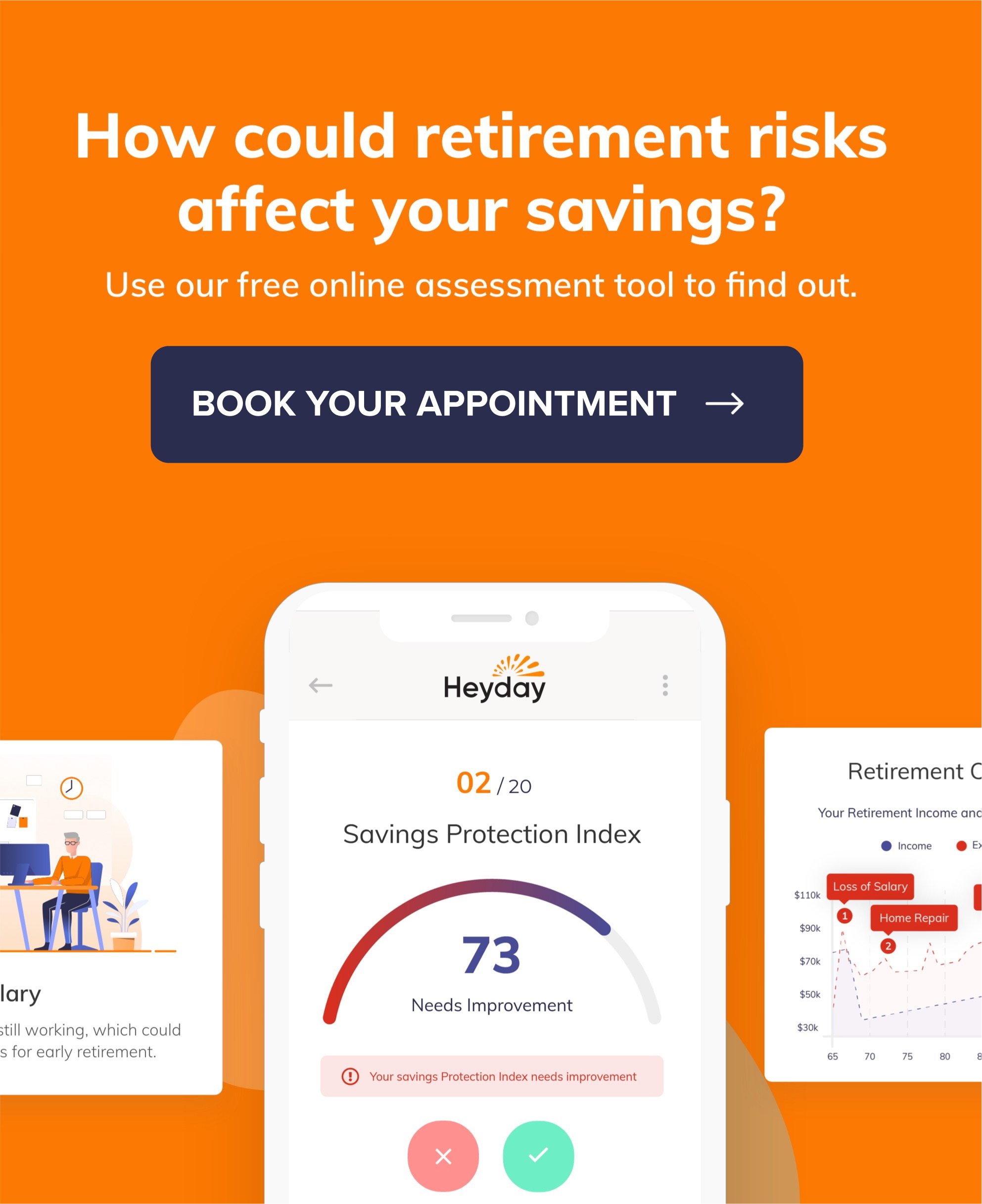Retirement Risk #11: Health Care Costs Up to Age 65 — An Issue for Early Retirement
Health Care Costs Don’t Have to Dictate Your Retirement Timeline
For most, paying high premiums for health insurance isn’t part of the retirement dream. Leaving the workforce before 65 is a little easier with these tips.
The idea of retiring early can be tempting for most people, as they will become eligible for Social Security benefits (even though this will reduce their monthly benefit if they start drawing before their full retirement age as outlined by the Social Security Administration).
There could be several financial risks associated with retiring early, and everyone’s situation is different. However, one costly pitfall if you retire before the age of 65 when Medicare kicks in — health insurance.
Some Ideas About How You May Be Able to Retire at 62 & Secure Coverage
If you’re planning to retire before the age of 65, health insurance coverage is likely at the top of your priority list. Aside from finding a job with health insurance benefits, there are options pre-retirees can consider taking, although they may not apply in every situation:
- Extend your previous employer-sponsored coverage - you may be able to stay on your current plan for a limited amount of time through Consolidated Omnibus Budget Reconciliation Act (COBRA) benefits — restrictions may apply, such as:
-
Only available for employers with 20 or more employees
-
It may cost you 102% of your current health plan
-
Coverage lasts up to 18 months
- Join your spouse on their employer-sponsored plan - of course, this option may not apply if you are unmarried or our spouse is already retired. Other restrictions may also apply, depending on the spouse’s coverage.
- Shop the private marketplace - most early retirees in good health will have no trouble finding private insurance. But, they can generally expect to pay more than they are accustomed to each month for the premium.
- Secure coverage through the marketplace - Healthcare.gov can be an excellent resource for finding a policy that adheres to Affordable Care Act (ACA) guidelines. Depending on your income, you may qualify for subsidized assistance with your premiums.
The ugly truth is, most of these options will be more expensive than we’d like. Here are a few examples:
Sample Plan Costs for 62-year-old Husband & Wife
Healthcare.gov Bronze EPO: $1,500.70 per month / $16,300 deductible
Blue Cross Blue Shield Bronze PPO/EPO: $1,554.19 per month / $16,300 deductible
To cover the health insurance gap from 62 to 65 for a married couple could cost an average of $54,000 in premiums alone (not including deductibles and costs for treatment or prescriptions). Retiring before Medicare eligibility is a decision that should be discussed with a professional to weigh all potential solutions and outcomes.
A Dilemma for Many: Delay Retirement, or Deal with Hefty Health Insurance Premiums?
With monthly premiums that can exceed mortgage payments, those who want to retire early are faced with hard decisions about whether to keep working until age 65. Many address the issue in one of the following ways:
Delay retirement until turning 65 - the idea of paying 2-3 times what someone would normally pay for health insurance under an employer’s plan may be too much for some wannabe retirees to stomach, and understandably so. Some may choose to work a few more years, but that can have consequences, too. Whether we like to think about it or not, we only get so many “active” years in retirement. Spending them at work simply won’t work for some people.
Retire but take budgeting to the extreme - another approach to offset anxiety is to retire before 65, but cut back all discretionary spending and try to live off Social Security alone. This approach may be problematic for multiple reasons:
-
-
-
- Taking Social Security before your full retirement age can result in a reduction in benefits for your entire life. It’s a personal decision that should be considered carefully.
- These reduced benefits may not be enough to cover basic expenses like groceries, utilities, and a mortgage. That’s because a full SS benefit is only about 27 to 40% of your working salary if you were a medium or high-income earner.
- Retire now and go uninsured or underinsured - this approach isn’t for the faint of heart. As we grow older, we are more likely to need health services, so going without is a risky endeavor. And choosing a bare-bones policy may leave retirees to fit the bill if they have preexisting conditions or need regular prescriptions.
Because these decisions have the potential to impact retirees’ lifestyle, they should consider speaking with a financial professional before making any big moves.
Consider this example:
Josh and Ruth are 62 and mentally ready to retire. The only issue is, they will be stuck without affordable health insurance until they turn 65 and are eligible for Medicare.
They’ve received a few quotes and explored other options, yet the price tag of $1,500/month is making them seriously consider working for three more years rather than have health insurance erode their nest egg too quickly.
Josh is reluctantly willing to work a little longer, but Ruth can’t imagine putting in three more years at her current job — which she dislikes a little more every day. How would you determine what to do if in their shoes?
Should they retire now, take Social Security early, and try to get on their reduced monthly benefits?
Should Ruth find a new job at 62? It may be difficult to find a position with the salary and seniority she is accustomed to.
Should they both just slog it out for another three years in their current jobs? Josh’s back pain is starting to slow him down already. What about all those retirement plans they made throughout their marriage?
This example highlights some very real issues retirees grapple with, none of which seem ideal.
Thankfully, with proper planning, pre-retirees like Josh and Ruth can retire when they want and still have enough to cover those big insurance premiums (and those big retirement goals).
The first step pre-retirees and retirees should take is an online retirement risk assessment. Free tools like Heyday’s Custom Retirement Review allow retirees to see where they stand in only a few minutes.
From there, they can easily speak with a professional to revise their strategy and minimize their risks without reducing their fun spending. Ready to assess your retirement strategy against your risks?
Start here with a free online assessment.
-
-

Written by Cindy Collins
Forbes Contributor & Retirement Financial Professional
Cindy Collins is a Heyday Retirement contributor with over 30 years of experience in personal financial services.

About Heyday
Heyday is a premier source for comprehensive tools and informative content designed to help retirees build a secure retirement income plan.
Subscribe
Stay in the know on a wide range of retirement topics.








